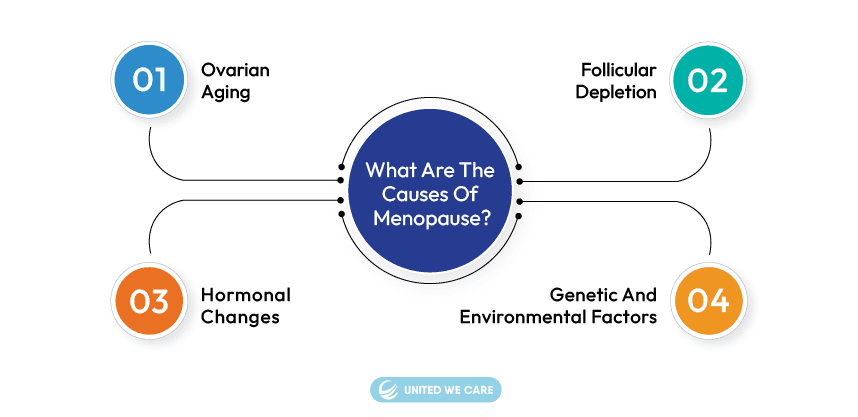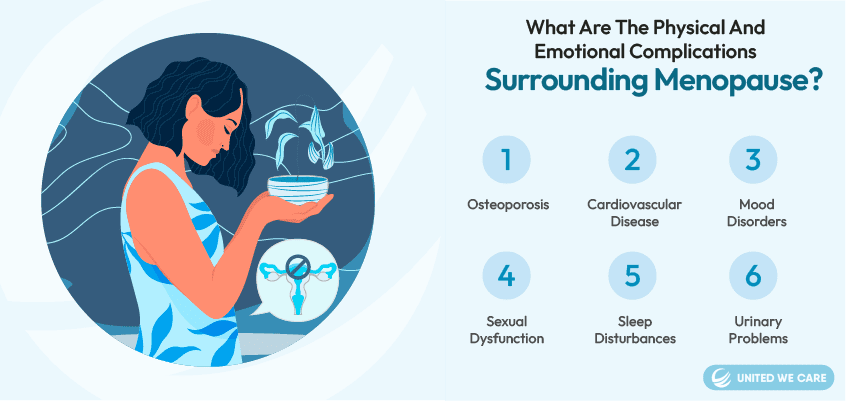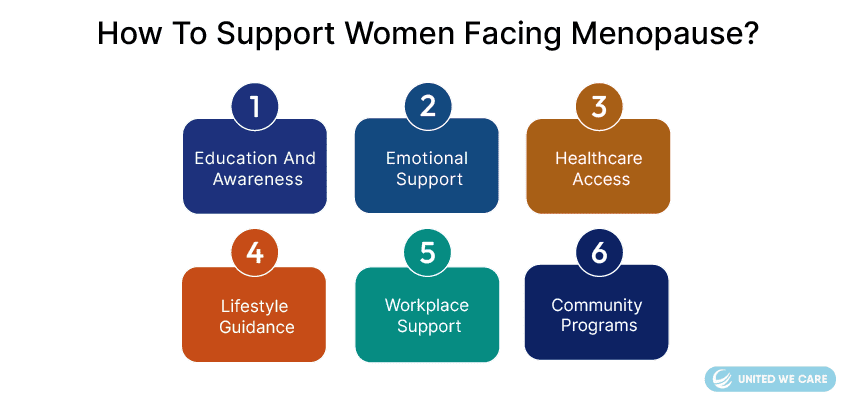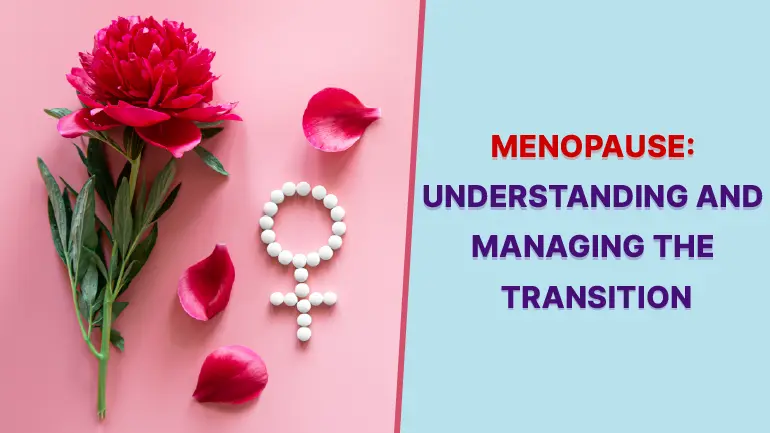Introduction
Are you a woman going through hormonal changes? Are you above the age of 45 years? It’s possible that you are moving toward a transitional phase as a woman, where you’ve reached the end of your reproductive years. This phase can be very difficult for some women. So, it’s important to get all the facts right and know what you can do to make your journey as smooth as possible. Through this article, let me help you understand this phase and how you can overcome any challenges you are or could be facing.
“It was a life-changing moment. I went from my swinging forties to full-blown menopause, and I was not prepared.” – Beverly Johnson [1]
What Is Menopause?
When I think about menopause, one major character that comes to my mind is Samantha Jones from the movie ‘Sex and the City 2.’ The whole gang goes to Abu Dhabi, and Samantha starts getting hot flashes. She didn’t even have the natural medicines that were designed specifically for her so that the journey of menopause could be smooth without her facing the impact of the hormones or losing her sexual drive. Since that didn’t happen, the whole trip was a mess for her, with her sweating, being cranky, and moody.
Every woman will have to go through menopause between the ages of 45 and 55. It marks the end of your reproductive years, and you stop your menstrual periods.
Menopause occurs in three stages:
- Perimenopause refers to the transitional phase before menopause when your hormone levels fluctuate.
- Menopause is the absence of your menstrual periods for 12 consecutive months.
- Postmenopause follows menopause, when your menopausal symptoms may gradually decrease, but long-term health still has to be kept in check.
What Are The Symptoms Of Menopause?
If you’re going through menopause, keep a check on the following symptoms that you could be facing because of the hormonal changes [3]:
- You could be facing hot flashes, which is a sudden feeling of warmth and intense sweating. Usually, you feel it on your face and your neck.
- You might be sweating a lot at night, which can cause sleep issues.
- You might feel more irritable and emotionally sensitive. It can even add to depression and anxiety.
- You might notice that your vagina is getting dry, and that may cause discomfort or pain during sex.
- You might have sleepless nights or have difficulty falling asleep. Basically, you could be facing symptoms of insomnia.
- You might want to engage in any sexual activity due to a reduced sex drive (libido), or you may not like what you liked earlier in terms of sex.
- You might start gaining weight around your waist and abdomen.
- You might frequently need to urinate and get urinary tract infections more quickly.
What Are The Causes Of Menopause?
Menopause occurs due to natural changes in your reproductive system. But here are some of the common causes of menopause [4]:

- Ovarian Aging: So every girl is born with eggs in her ovaries. As you grow older, the quantity and quality of these eggs start going down. Plus, your ovaries can become less responsive to hormonal signals from your brain. So you start producing less estrogen and progesterone, which are essential hormones for your reproductive system to be active.
- Follicular Depletion: Your ovaries contain follicles that take care of the immature eggs. As you grow older, the follicles also start reducing, and the ones that are there also stop responding to the hormones. Ultimately, there will be no good-quality follicles left, and you will stop ovulating.
- Hormonal Changes: When your ovaries stop responding and functioning properly, your hormone production also starts going down. There are two important hormones that help with the production of eggs and keep the ovaries healthy – estrogen and progesterone. When these hormones are not produced in proper quantity, the symptoms of menopause start coming up.
- Genetic And Environmental Factors: Your genes could be playing a huge role in determining when your menopause will start. Plus, you could be living and working in an environment that is toxic. That can directly impact ovarian aging and push your body to move toward menopause.
What Are The Physical And Emotional Complications Surrounding Menopause?
Did you know that when you go through menopause, your physical and emotional health can get impacted drastically? Here’s what you can face [2] [5]:

- Osteoporosis: When your estrogen levels start going down, your bone density starts going down. That means that your bones are going to become more fragile, increasing the risk of osteoporosis and fractures in the future.
- Cardiovascular Disease: Your heart can take the symptoms of menopause badly. The constant sweating, heart palpitations, and sleeplessness can increase the risk of heart disease, high blood pressure, and high cholesterol levels.
- Mood Disorders: Hormones help to balance and manage your mood. So, when your hormones are only imbalanced during menopause, your mood is bound to have its ups and downs. You might even become more prone to depression and anxiety.
- Sexual Dysfunction: You might start observing that your vagina is getting dry (vaginal dryness) due to hormonal changes. Due to this, you might find it difficult to feel any sexual desire or satisfaction during sex.
- Sleep Disturbances: You may often experience sleep issues like insomnia, night sweats, disturbed sleep, etc. This may result in you feeling tired and irritated during the day.
- Urinary Problems: The decline in estrogen can lead to changes in the urinary tract. You might observe that you have to use the washroom more frequently for urination and even attract more urinary tract infections.
How To Manage Symptoms Of Menopause?
Although menopause is a natural event in a woman’s life, you don’t have to bear the struggles that come with it. Here’s what you can do to manage the symptoms [6]:
- Hormone Therapy: Your gynecologist can suggest hormone therapy that can effectively reduce the symptoms of menopause. In this, your doctor can suggest that you take pills or injections of just estrogen or a combination of estrogen and progesterone.
- Lifestyle Changes: You can add exercise and eating a healthy diet filled with fruits, vegetables, whole grains, etc., to your daily routine. That way, you would be able to maintain your weight and avoid any weight gain, mood swings, or heart-related risks during menopause.
- Non-Hormonal Therapies: There are certain medicines that your doctor can give you that are not hormone-based. These medicines can naturally help you reduce the effects and symptoms of menopause. In fact, they can help you lower stress levels as well so that you don’t have an added worry to handle. You can even have some prescribed vitamins to help manage the symptoms.
- Vaginal Lubricants And Moisturizers: You can get some vaginal lubricants and moisturizers from your local pharmacy. These can help relieve vaginal dryness and discomfort during sexual intercourse.
- Stress Reduction Techniques: One of the best ways to manage menopause is by practicing stress-management techniques. You can bring meditation, breath control, yoga, etc., into your life and daily life to not get over-stressed.
Learn more about- High risk of having depression in woman
How To Support Women Facing Menopause?
For some women, the menopause time can be very difficult. They might need a lot of support from friends, families, and colleagues. Here’s what you can do to help [7]

- Education And Awareness: There are a lot of myths and misconceptions around menopause. So as the first step to supporting women during menopause, you can spread awareness and educate the people around you about the symptoms, possible complications, and how they can help manage them.
- Emotional Support: Mostly, women don’t feel heard during menopause. That itself can add to their irritability. So, offer them empathy, active listening, and create a safe space for open discussions. Assure them that you are there for them.
- Healthcare Access: If you know that a woman around you is going through menopause, then make sure that they go for regular checkups with their doctors. They can discuss their symptoms, concerns, and possible treatment options.
- Lifestyle Guidance: You can guide the women in your life to choose a healthy lifestyle. You can encourage them to eat healthy and exercise regularly. It’s possible that if you tag along, then they might be more motivated to follow a healthy routine.
- Workplace Support: If you’re a boss, then bring in certain work policies for your female employees facing menopause. You can introduce flexible schedules, temperature control, and privacy for managing symptoms. Plus, allow them to be open with you and the colleagues around you without feeling judged or demeaned.
- Community Programs: You can help women participate in community-based programs that offer education, support groups, and resources for women going through menopause. That way, you can make sure people are aware and get the support needed, either as a woman going through menopause or being around a woman who is facing menopause.
Read more about- Emotional challenges during menopause
Conclusion
As women, we all have to go through menopause at some time. Although not every woman would go through the harsh symptoms and side effects of menopause, it’s important to be aware and get regular check-ups done to ensure you are in the best of health. For that, you can even start exercising and eating healthily. Take whatever help you need to manage your mood swings, vaginal dryness, etc. Surround yourself with people who understand you. They can really make your journey smoother. Don’t worry! Like all the other challenges life might have thrown at you, you will sail through this challenge as well.
To understand and manage menopause better, contact our expert counselors or explore more content at United We Care! At United We Care, a team of wellness and mental health experts will guide you with the best methods for your well-being.
References
[1] “Beverly Johnson on Having ‘Full Blown Menopause’ at 47: ‘You’re Moist in All the Wrong Places,’” Peoplemag, Nov. 07, 2022. https://people.com/health/beverly-johnson-47-hysterectomy-menopause-series/
[2] “Menopause – Symptoms and causes,” Mayo Clinic, May 25, 2023. https://www.mayoclinic.org/diseases-conditions/menopause/symptoms-causes/syc-20353397
[3] “Menopause symptoms and relief | Office on Women’s Health,” Menopause symptoms and relief | Office on Women’s Health, Feb. 22, 2021. https://www.womenshealth.gov/menopause/menopause-symptoms-and-relief
[4] N. Santoro, “Perimenopause: From Research to Practice,” Journal of Women’s Health, vol. 25, no. 4, pp. 332–339, Apr. 2016, doi: 10.1089/jwh.2015.5556.
[5] T. Muka et al., “Association of Age at Onset of Menopause and Time Since Onset of Menopause With Cardiovascular Outcomes, Intermediate Vascular Traits, and All-Cause Mortality,” JAMA Cardiology, vol. 1, no. 7, p. 767, Oct. 2016, doi: 10.1001/jamacardio.2016.2415.
[6] “What Is Menopause?,” National Institute on Aging, Sep. 30, 2021. https://www.nia.nih.gov/health/what-menopause
[7] S. E. Looby, “When are the most vulnerable, more vulnerable to cognitive changes during the menopause transition?,” Menopause, vol. 28, no. 4, pp. 352–353, Feb. 2021, doi: 10.1097/gme.0000000000001748.











